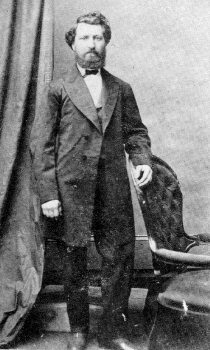![]()
| Filiation Généalogique des Guérêt~Dumont |
| Home Page | The Journey | Family History | Donations | Book Purchase | Family Roots | Resource Links |
| Name Origin | Coat of Arms | LaFamille History | Join the Society | Website Review | FAQ | Reunions |

Louis Riel, a leader of his people in their resistance against the Canadian
government in the Canadian Northwest, is perhaps
the most controversial figure
in Canadian historiography. His life and deeds have spawned a massive and diverse
literature.
He was born in the Red River Settlement (in what is now Manitoba) in
1844. A promising student, he was
sent to Montreal to
train for the priesthood, but he never graduated. An attempt at training as a lawyer ended
similarly, and by 1868 Riel was back
in the Red River area. Ambitious, well educated and bilingual,
Riel quickly emerged as a leader among the Métis of the Red
River. In
1869-1870 Riel headed a provisional government, which would eventually
negotiate the Manitoba Act with the
Canadian government. The Act established Manitoba as a
province and provided some protection for French language rights.
Riel's leadership in the agitation, especially his decision to execute a
Canadian named Thomas Scott, enraged anti-Catholic and
anti-French sentiment in
Ontario. Although chosen for a seat
in the House of Commons on three occasions, he was unable to
take his seat in
the house. In 1875, Riel's role in the death of Scott resulted in his exile
from Canada. These years in exile
would
include stays in two Quebec asylums and the growing belief in Riel that
he had a religious mission to lead the Métis people of the
Canadian
northwest.
In 1884, while teaching in Montana at a Jesuit mission, Riel was asked by a
delegation from the community of Métis from the
south branch of the
Saskatchewan River to present their grievances to the Canadian government. Despite Riel's assistance, the
federal
government ignored Métis concerns.
By March of 1885, Métis patience was exhausted and a provisional
government
was declared.
Riel was the undisputed spiritual and political head of the short-lived 1885
Rebellion. He never carried arms
and hindered the work of his military head,
Gabriel Dumont.
Riel was increasingly influenced by his
belief that he was chosen to lead the Métis people. On May 15, shortly after the fall of
Batoche, Riel surrendered to Canadian
forces and was taken to Regina to stand
trial for treason.
At his trial, Riel gave two long speeches which demonstrated his powerful
rhetorical abilities. He personally
rejected attempts by his defense counsel to prove he was
not guilty by reason
of insanity. On 1 August 1885, a
jury of six English-speaking Protestants found Riel guilty but recommended
mercy. Judge Hugh Richardson
sentenced him to death. Attempted
appeals were dismissed and a special re-examination of Riel's mental state by
government appointed doctors found him sane.
He was hanged in Regina on 16 November
1885. His execution was widely
opposed in Quebec and had lasting political ramifications.
Photo courtesy Saskatchewan Archives Board.
Page information courtesy of Northwest Resistance library http://library2.usask.ca/northwest/contents.html